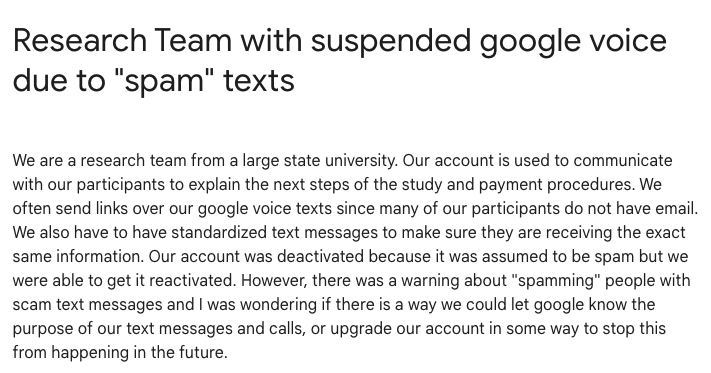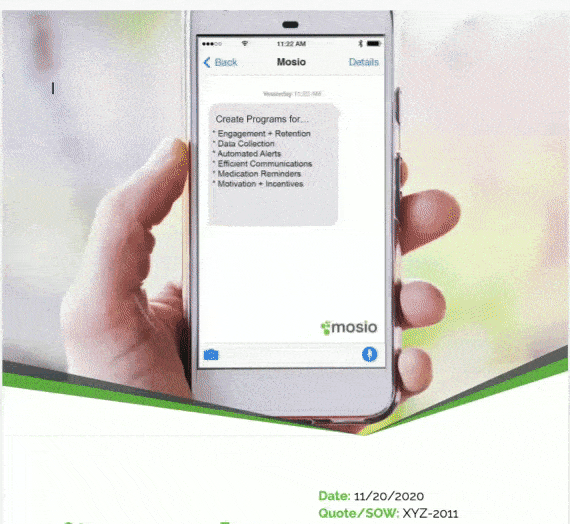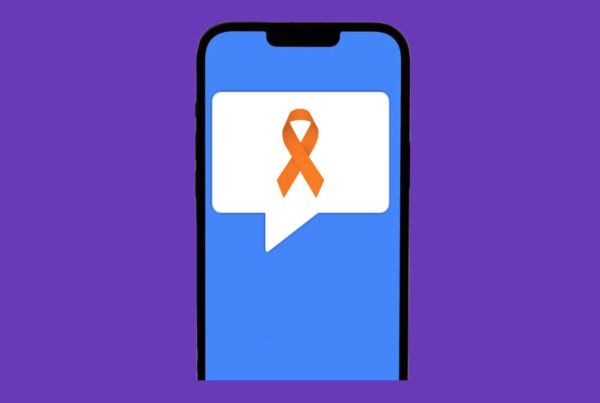Google Voice’s free text messaging feature has gained popularity among clinical researchers as a tool for subject communications and data collection. However, using the app in your study could lead to unexpected challenges. Many researchers have sought alternatives after encountering issues with Google Voice. Free is great, but we believe there’s a better way.
Every month we hear more researchers telling us they’ve been using Google Voice to communicate with study subjects, but then run into problems. While we completely understand why some research teams begin using it (free being is the biggest reason), it can create a host of problems including getting blocked, no visibility into whether a message has been delivered or not, or having your account be shut down. One particular issue we’ve heard recently was “the subjects have become accustomed to communicating with us from this specific number, now we can’t use it anymore.”
You might be reading this, thinking “well that’s nice, Mosio, but you just want to make money.” While it’s true that our business charges money for services to operate, it’s not the reason for this post. Obviously, Google is very good at making money and most of their services are offered for “free.”
We get a large number of what we call “Google Voice Expats” coming to Mosio. Researchers who have been using it for some time, only to run into problems. Then they call us.
Our hope in creating this post is to educate researchers, at any point in considering using text messaging software to communicate with study subjects, and offer some guidance on why it is or may cause issues. It’s not because Google Voice doesn’t work for its intended purpose. It’s that its intended purpose isn’t for communicating with a group of study subjects in high frequency.
They even state:
“Use Google Voice for interactive messaging only – Due to carrier limitations and to protect against spam, Google Voice messaging is intended only for interactive conversations. It’s not intended for bulk messaging, which can result in messages being reported as spam and blocked.”
Some reported Google Voice texting issues:
- Google Voice typically limits text messages to five recipients.
- If you use it to send mass messages to participants, your messages may be flagged as spam and your number could be blocked. (This happened to a research team, see below)
- Google will not sign a BAA (Business Associate Agreement).
- There is no quick resolution or alternative solutions when problems arise.
- It is not HIPAA-compliant.
- It may prevent you from sending texts if you send several messages in a short amount of time.
- Adding links in your texts may also result in them being flagged as spam.
Other Considerations
Legal and Privacy Concerns
Researchers dealing with protected health information are subject to HIPAA laws, but Google Voice is not covered under Google’s business associate agreement and does not meet HIPAA security standards. Using the app for research communication would violate HIPAA law and leave participants’ information vulnerable to hacking. Google has also been fined for privacy violations by the Federal Trade Commission, making it a risky choice for handling sensitive information.
Limited Settings
Google places a limit on the number of texts that can be sent, which is not always disclosed to users. This may not be sufficient for larger studies, and some researchers have experienced account lockouts and data loss.
Incompatible with Clinical Researcher Workflows
Clinical research requires specific texting needs, such as sending surveys, appointment reminders, and follow-up messages. However, Google Voice only offers traditional two-way texting and does not allow for automated messages or sending the same message to multiple recipients. It also lacks the ability to access data from sent messages and participants’ replies.
Mosio Is The Best Google Voice Alternative
This isn’t a “Google is Bad, Mosio is Great” post. If you’re looking to simply text with study subjects one-on-one, it may work well for you. That said, Mosio offers solutions specifically designed for clinical research teams. While we have a two-way TextChat module, our focus is on automation to make your workflow easier when communicating with study subjects, whether for text message surveys, appointment reminders, or text-based interventions.







